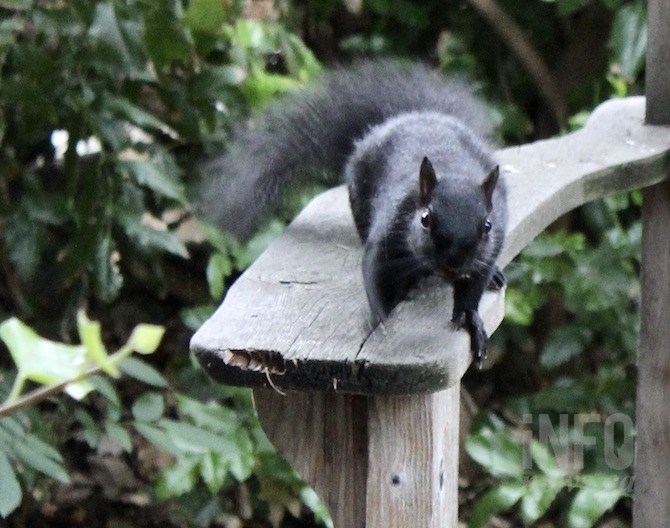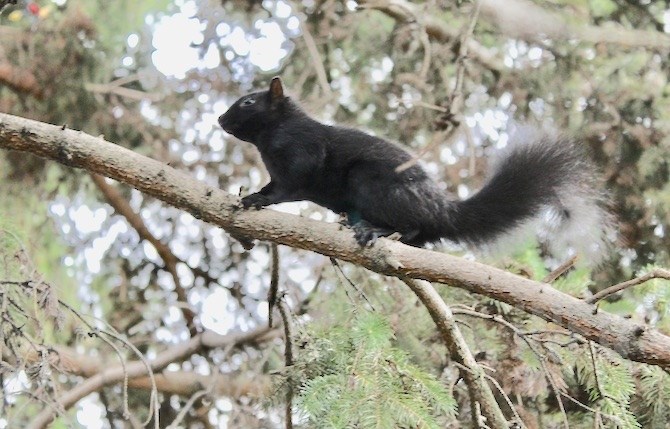
The invasive grey squirrel is more often black in Kelowna than grey.
(ROB MUNRO / iNFOnews.ca)
July 12, 2020 - 6:00 AM
Jennifer Reece doesn’t have any hard data to back her up, but believes that invasive grey squirrels are cutting into the annual harvest at the Gellatly Nut Farm.
“When I first started at the farm, six or so years ago, I would maybe count five squirrels in a week,“ Reece, secretary for the Gellatly Nut Farm Society, told iNFOnews.ca. “Now you count 15 before you get out of the car.”
The nut crops are very dependent on weather so she doesn’t know if declining harvests are the fault of the weather or the grey squirrels that are very active in the trees once the nuts are ripe, likely hauling them away before they can fall to the ground to be collected by society members for their annual fall sale.
Karl Larsen, a Thompson Rivers University ecology professor, warned the province that the squirrels were invading Kelowna in the mid 2000s but nothing was done about them. Since then, they’ve managed to cross into West Kelowna and at least part way to Penticton. They’re also established in Vernon and there have been sightings reported to Larsen in Kamloops.
In 2016 he co-authored a study into food preferences for Kelowna grey squirrels (which are often black rather than grey but are the same species).
The study found that, while birdseed and peanuts were quite popular, they weren’t always chosen ahead of various fruits. Out of the fruits, apples were the favourites, followed by cherries. Strawberries, wine grapes and apricots hardly passed muster.
But, despite their proliferation in the Central Okanagan, Glen Lucas, general manager of the B.C. Fruit Growers’ Association, hasn’t hear any complaints about grey squirrels from his members.
Therein lies the conundrum on how to deal with this growing menace.
Because the squirrels were imported to Vancouver in the early 1900s and three escaped squirrels established colonies on Vancouver Island in the 1960s, the province seems to see them as an established species in B.C. Therefore, it’s not willing to put any money into eradicating them in the Okanagan.
That might change if there was proven damage to agricultural crops or if they cause other problems, such as nesting in buildings or shorting out electrical systems.
But, just like Reese not having hard data, Larsen can’t prove they’re a threat in the Interior.
“I’m sure if I can get the money to do research I could say, ‘look these grey squirrels are hurting the bird population, they’re having an impact on nut farms or other agricultural products,’” Larsen said. “You can’t just drop a new species into an ecosystem and say, it’s not going to have any effect. It’s just whether those effects are really obvious or not. It’s a Catch 22. Unless you can get the money you can’t push for action very hard but, to get the money to do that you need to be able to say there are problems. I just go around and around and around.”
That’s bad news for Gail Wallin, executive director of the Invasive Species Council of B.C.
“I live in Williams Lake, so when we get our first grey squirrel here, are we going to follow Karl’s advice and say it’s a problem, let’s get rid of it?” she asked. “Let’s stop if from going over to the Kootenays. Let’s stop if from going up into the Cariboo. Let’s stop it from going into the Kamloops area.“

(ROB MUNRO / iNFOnews.ca)
The grey squirrel is one of the 100 most invasive species on the planet, according to the Global Invasive Species Database. They are only listed, not ranked.
“The challenge in my world of invasives is that no one considers this a problem when there are no numbers or low numbers,” Wallin said. “If you have one dandelion in your front yard, if you don’t take care of that you’ll have a thousand. It’s way easier to take care of the one. The challenge is, if you don’t remove it when they’re at the extremely low population size, it’s going to be almost impossible to remove them when they’re at a high population density.”
The Invasive Species Council has reporting options on its web site but, at this point, all that does is document their numbers and possible spread.
They can be live trapped and then killed but, to do that humanely that usually means paying a veterinarian to do the job.
iNFOnews.ca spoke to a Kelowna pest control company and was told they’ve trapped about 100 red and black squirrels this year and released them into the wild. That’s fine with the native red squirrels but black squirrels are actually grey squirrels with different colouring. The Kelowna squirrels tend to be more black than grey, Larson said.
He's actually heard of grey squirrels being rescued, rehabilitated and released back into the wild in the Lower Mainland. Releasing them is illegal.
There is a Vancouver company that has developed a trap that humanely dispatches the squirrels. Larsen said it has found a good market for its traps in England where efforts are underway to get rid of the grey squirrels but sales have not taken off in B.C., as far as he knows.
The Kania web site lists the traps for sale for $89. They’re also good for opossums, skunks, mink, marten, rats, rodents and other small pests.
READ MORE: One of the world's most notorious invasive species has free run of the Interior
To contact a reporter for this story, email Rob Munro or call 250-808-0143 or email the editor. You can also submit photos, videos or news tips to the newsroom and be entered to win a monthly prize draw.
We welcome your comments and opinions on our stories but play nice. We won't censor or delete comments unless they contain off-topic statements or links, unnecessary vulgarity, false facts, spam or obviously fake profiles. If you have any concerns about what you see in comments, email the editor in the link above.
News from © iNFOnews, 2020